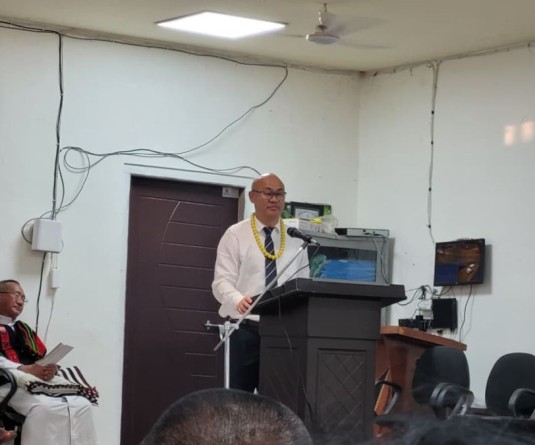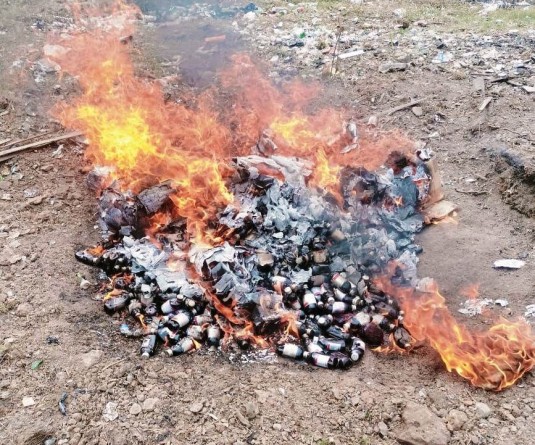
Phek| January 30 : Poor physical infrastructure and paucity of teachers continue to mar the education sector in Nagaland. With a fair amount of money going into the education, it is wonder why the state’s government schools are still in a dismal condition.
Phek Village GHS seeks department’s attention
In an abysmal state of affairs, Phek Village Government High School is struggling to function with its weak infrastructure and inadequate human resources. More than 80 years of innings Phek Village GHS is one of the oldest education centres in the state. The school was established in 1929 and was upgraded to a high school in the year 1993. The school hasn’t seen a single major repair since establishment.
Phek Village GHS currently has 224 students and 14 teachers. There are eight class rooms but only five are in use. The others are too small to accommodate students during regular classes; and are being used to conduct alternative subject classes.
The classrooms which are in use are also very small but the school is managing somehow; accommodating about 40 students in one room. Since there are no extra rooms, breaking up students into sections is not possible. With student enrollment increasing each year, the school is facing acute problems. The school also has no laboratory where practical science classes can be conducted. The materials used for the science classes are simply stored in a box kept in the staff room. Although the department has provided computer sets to the school, it has no room to store them.
The school building is also in shambles. The doors and windows are either broken or patched up with aluminum sheets. The school has no assembly hall and currently holds assembly in a shed constructed by 31 Assam Rifles under civic-action programme. The school receives a meager sum of Rs. 3000 from Sarva Siksha Abhiyan (SSA) annually for maintenance. It is insufficient.
There is also paucity of teachers in the school. The school has only 2 science teachers who teach students from classes 6 to 10. Science subject in lower classes are taught by teachers of other subjects. The school does not have a computer instructor although it is the 6th subject. Infact, there is not a single teachers for any of the 6th subject prescribed by the board of school education. The school has only one teacher for Hindi who is not qualified to teach higher classes. As a result, many students in higher classes interested in Hindi have had to opt out. The school authority has sought the department’s attention to their problems on several occasions. It has reportedly written to the Directorate on the problems being faced by the school but is still awaiting response.
With the Right to Education Act coming into force in the state, perhaps, the government ought to look into the physical infrastructure development of schools and equip them with adequate trained teachers.
Phek Village GHS seeks department’s attention
In an abysmal state of affairs, Phek Village Government High School is struggling to function with its weak infrastructure and inadequate human resources. More than 80 years of innings Phek Village GHS is one of the oldest education centres in the state. The school was established in 1929 and was upgraded to a high school in the year 1993. The school hasn’t seen a single major repair since establishment.
Phek Village GHS currently has 224 students and 14 teachers. There are eight class rooms but only five are in use. The others are too small to accommodate students during regular classes; and are being used to conduct alternative subject classes.
The classrooms which are in use are also very small but the school is managing somehow; accommodating about 40 students in one room. Since there are no extra rooms, breaking up students into sections is not possible. With student enrollment increasing each year, the school is facing acute problems. The school also has no laboratory where practical science classes can be conducted. The materials used for the science classes are simply stored in a box kept in the staff room. Although the department has provided computer sets to the school, it has no room to store them.
The school building is also in shambles. The doors and windows are either broken or patched up with aluminum sheets. The school has no assembly hall and currently holds assembly in a shed constructed by 31 Assam Rifles under civic-action programme. The school receives a meager sum of Rs. 3000 from Sarva Siksha Abhiyan (SSA) annually for maintenance. It is insufficient.
There is also paucity of teachers in the school. The school has only 2 science teachers who teach students from classes 6 to 10. Science subject in lower classes are taught by teachers of other subjects. The school does not have a computer instructor although it is the 6th subject. Infact, there is not a single teachers for any of the 6th subject prescribed by the board of school education. The school has only one teacher for Hindi who is not qualified to teach higher classes. As a result, many students in higher classes interested in Hindi have had to opt out. The school authority has sought the department’s attention to their problems on several occasions. It has reportedly written to the Directorate on the problems being faced by the school but is still awaiting response.
With the Right to Education Act coming into force in the state, perhaps, the government ought to look into the physical infrastructure development of schools and equip them with adequate trained teachers.






